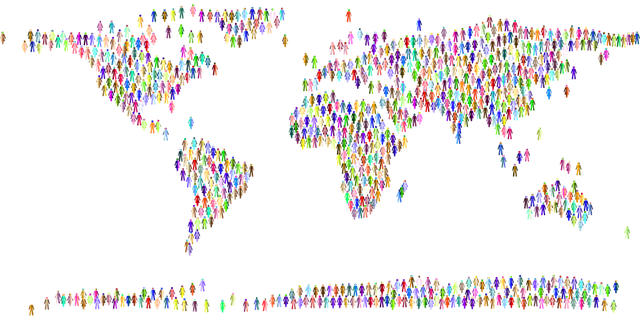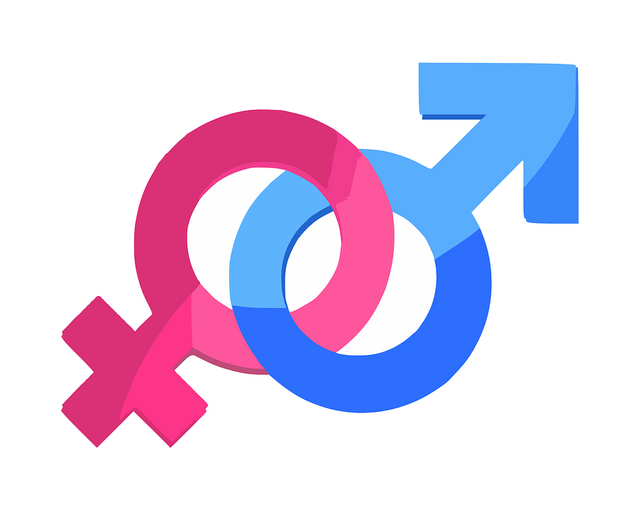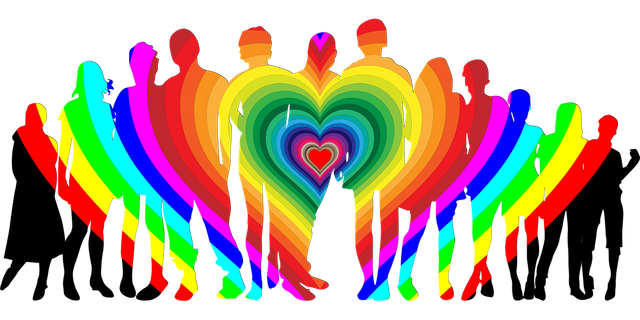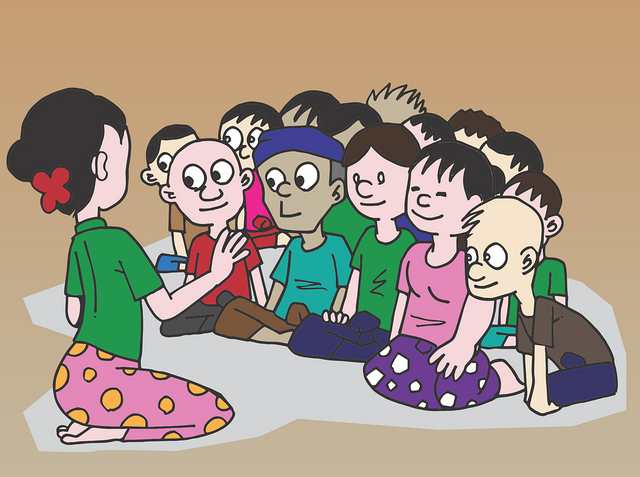The Anthropology of Sex and Gender - Part 1 : Introduction

The Anthropology of Sex and Gender - Part 1 : Introduction
Introduction
The linked concepts of "sex" and "gender" describe the most basic, universal division within the human species. Gender should be the starting point of any social science, just as the separation of the sexes is the starting point in biology. Curiously, however, gender is a relatively recent topic in anthropology and sociology, and is still not a prominent field in either of these disciplines.
In this series, we consider why this topic includes a study of sex as well as gender. We will learn that the term "sex" primarily refers to biological phenomena, while the term "gender" is used to indicate the sociocultural patterning of differences between men and women.
I would also like to encourage you to please read the psychology of sex/gender in a brilliant article by @abigail-dantes : What Makes a Boy a Boy & a Girl a Girl?.
Terms and their Interpretation
You may be wondering why we are so concerned about terminology in this series. Terminology is always a good starting point because terms are the expressions of very serious matters, such as concepts, paradigms, ideologies and the complete orientation of disciplines. For this reason, discussing terminology is an appropriate way of introducing these more serious issues and addressing them at the outset.
Sex is a biological phenomenon, while gender is a sociocultural one, which infers that issues of gender are determined by culture. These meanings are not fixed, however. The public views "gender issues" as women's issues"
Sex
Nevertheless, it is important to understand that while sex, as a biological phenomenon, may seem straightforward, it is not as simple as it initially appears to be. When we first learn about sexual differences, we are told that men have XY chromosomes and women have XX chromosomes, and this determines whether someone is a man or a woman. These sets of chromosomes determine how your external genitalia develop. Many people's knowledge of the biological differences between the sexes stops here. However, there are variations in chromosomes that complicate this matter, thus making sex a contested concept.
Some variations include XX women being born with congenital adrenal hyperplasia, or overactive adrenal glands, which results in their bodies producing more masculine features, while still having external female genitalia. Then again, some males may be born with XXY chromosomes; the extra (female) chromosome causes these males babies to have a lower uptake of testosterone (Dreger 2010:22-23). Moreover, some people are born as intersex, where their genitalia are not clearly male or female, or there is a difference between the chromosomal development and the external genitalia. The prevalence of these different types of men and women is difficult to establish. The most frequently cited research is a report by Blackless, Charuvastra, Derryck, Fausto-Sterling, Lauzanne & Lee (2000), which looked at birth rates in different North American and European cities. They found that 1 in 100 babies with genitalia or chromosomes that are somewhat different from the established norm. Sometimes this is detectable at birth and, in previous decades, parents of these babies decided at birth to remove some genitalia, often with disastrous effects for the children. However, many intersex individuals go through life without ever knowing that they are intersex.
As discussed above, there are many variations in the biology that determines our sex categorisation. But if something as seemingly neutral as sex is so difficult to determine, then how do we understand gender?
Gender
Many people's understanding of gender is to conflate it with being male or female. Gender is a sociocultural understanding of the role of people. Gender is not a binary concept (either you are male or female). Instead, gender runs along a continuum that allows for more than one option. "Gender" is also not just a synonym for speaking about women and women's issues. Understanding how gender is constructed is not just about the understanding of sociocultural roles; it involves understanding who has power in society, how they use it and what we can understand about the society.
The analysis of gender is at the heart of the analysis of power relations. - Arnold & Brady 2011:1
Simone de Beauvoir, the famous French feminist, once said that:
"one is not born, but rather, becomes, a woman"
By this, she meant that women are taught how to be women by society in which they live. In a similar manner, men are also taught how to be men, what their appropriate roles are, and how to perform these. Moreover, how you perform your gender role is not static over the course of your lifetime; there are different expectations for women of a certain age, or for boys and men. In different situations, we may emphasise different aspects of our gender performativity above others. Different sociocultural situations will dictate what appropriate role for a male or female is. When you closely follow the ideal type within your society, you are rewarded, if you do not, you are censured (Mullins 2006:9). And the censure can often be violent, as many masculine women and effeminate men can attest.
But gender is not only or even primarily about women. There are also ideas about how men should behave in order to seen as "proper" men (Mullins 2006). Masculinity is closely aligned with social power and is often not analysed, making it seem natural (Arnold & Brady 2011:1). As with the gendered construction of women's roles, males are also encouraged to act in certain ways, and rewarded when they do so. Expressions of masculinity are policed by their peers, and men that do not live up to notions of masculinity in a specific context are derided. Masculinity is not one thing but is context-specific (Mullins 2006:10).
End of Part 1
Thank you for reading.
Images are linked to their sources in their description and references are stated below.
Authors and Text Titles
A Dreger 2010: Sex typing for sport
Blackless, Charuvastra, Derryck, Fausto-Sterling, Lauzanne & Lee 2000: American journal of human biology
Intersex Society of North America (ISNA)2008:
CW Mullins 2006: Holding your square: masculinities, street life and violence
JH Arnold & S Brady 2011: Introduction, in What is masculinity? Historical dynamics from antiquity to the contemporary world
Simone de Beauvoir










You received a 10.0% upvote since you are not yet a member of geopolis.
To read more about us and what we do, click here.
https://steemit.com/geopolis/@geopolis/geopolis-the-community-for-global-sciences-update-4
If you do not want us to upvote and comment on your posts concerning earth and earth sciences, please reply stop to this comment and we will no longer bother you with our love ❤️
As some who often confuses sex and gender without meaning to, this series is going to be very interesting to me. Thank you! Resteemed.
I am totally with you on this one. :)
@Zest is a guarantor for working out and explaining really cool but rarely considered stuff!!
Hi @techslut!!!!!
I firstly want to apologize for the delay in responding, I read your comment upvoted it and was meant to come back and reply but I sometimes get overwhelmed with the workload of curating and forget about my own posts.
I am truly honoured and humbled that you have found my post interesting and worthy of your resteem.
Thank you sincerely:)
Hi Zest! I love that you pointed out the importance of identifying the difference between sex and gender when used in terminology!
The point you made in regards to society "rewarding" those who adhere to their gender roles is so sadly true.
Have you ever seen the TED talk The Masks We All Wear by Ashanti Branch? In it, Branch spoke of the terminology used to make him "man up" in order to meet societal expectations and how these types of phrases and judgements form a mask that everyone is expected to wear.
This is a very important topic, and you are approaching it in a very academic (but approachable) manner, which I'm sure some people will appreciate.
I'm looking forward to the rest.
Thank you @poet.
I apologize for the delay in responding:)
Oh, a fellow archaeologist and a terminology aficionado! What a great find ;)
This is a topic of high interest to me since the "problem" of gender in language was raised quite a few times recently - people enquiring my view as a terminologist.
I wanna see where this journey takes before I contribute to the topic.
BTW, I like your style of writing, it's clear and to the point.
Hey @docsmith:)
Apology for the delay in responding.
Once I read this I had the biggest smile ever, and I immediately followed you and sent you an invite to SteemSTEM. I apologize for not being in the room to Welcome you, I hope we can catch up soon.
Hello!! You might also consider to support @geopolis !! What a great post! I look forward to more
Hi!!!
Apology for the delay in responding.
I will check it out thank you for the info:)
Came here from abigail's post and have to say that I was not disappointed. Although I have been deemed to have some, well, controversial views when covering this subject it appears that to some extent that they are shared with information given in this post for instance that there is a biological aspect to sex and as such it isn't in itself a complete social construct. Nor is it binary however due to the rarity of many of those mutations it is generally, in my opinion, acceptable to generalize certain things to those whom fit the regular XX or XY definition. What I mean is you could say something like "[biological] females have a higher risk for osteoporosis." and it would be deemed correct.
I don't know if I am making some convoluted argument that makes no sense. My apologies, I liked the post Zest and I am looking forward to the subsequent dispatches within the series.
excellent post very interesting and I follow you best regards
Thank you
Great explanation of the differences between sex and gender!
At the end of the day, the characteristics that we attribute to the gender "male" or "female" are just a social structure made by society... while sex is defined by science, even though sometimes science has a hard time defining them
PS- i'm also waiting for a better explanation on this, waiting for the next post
Hi @teutonium:)
Apology for the delay in responding.
Thank you the comment and support:)
Nice one zest, looking forward to what's to come on this series, already imagining an awesome series though ,we know @zest always brings the best at it :)
Thank you!!!